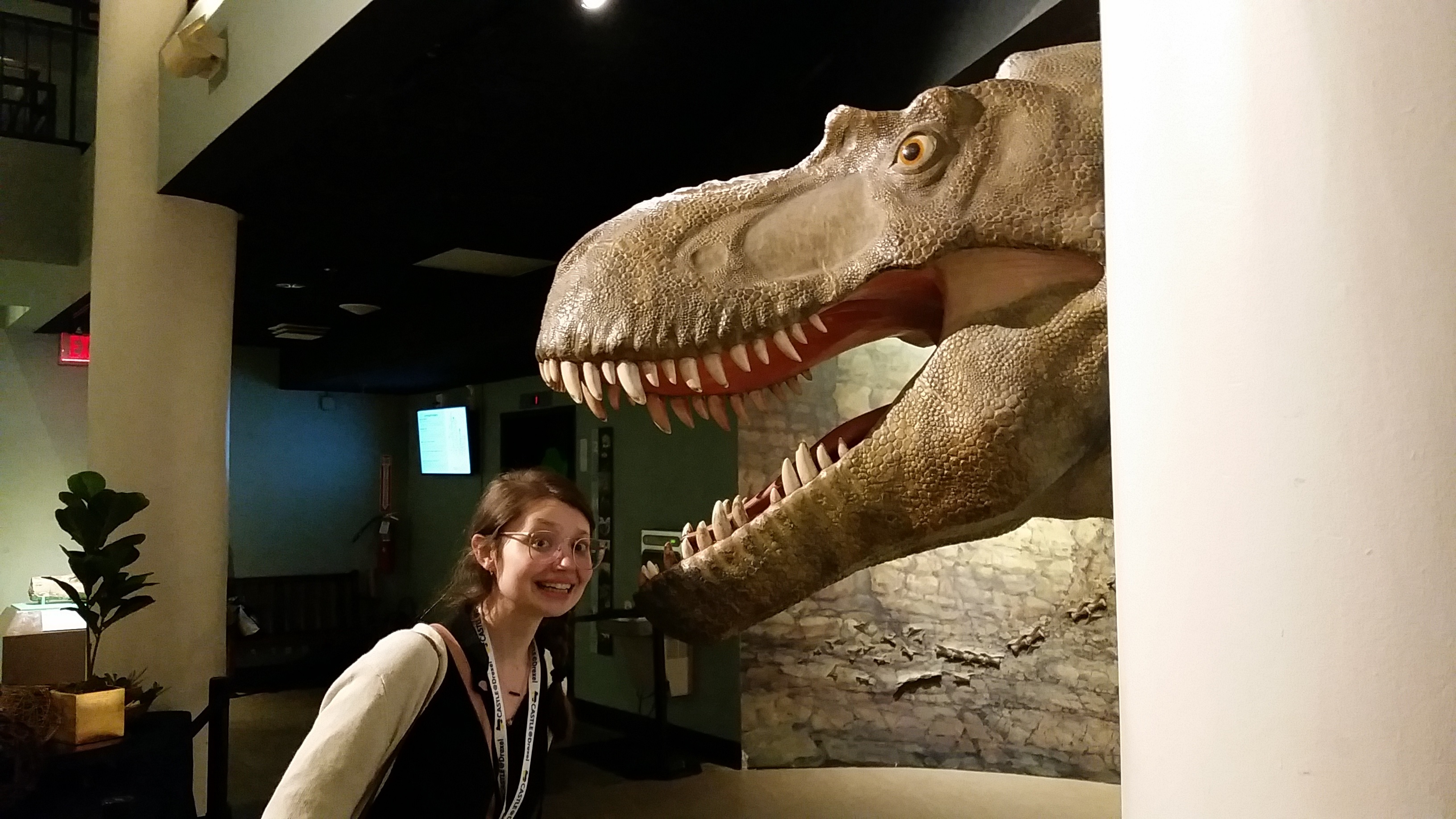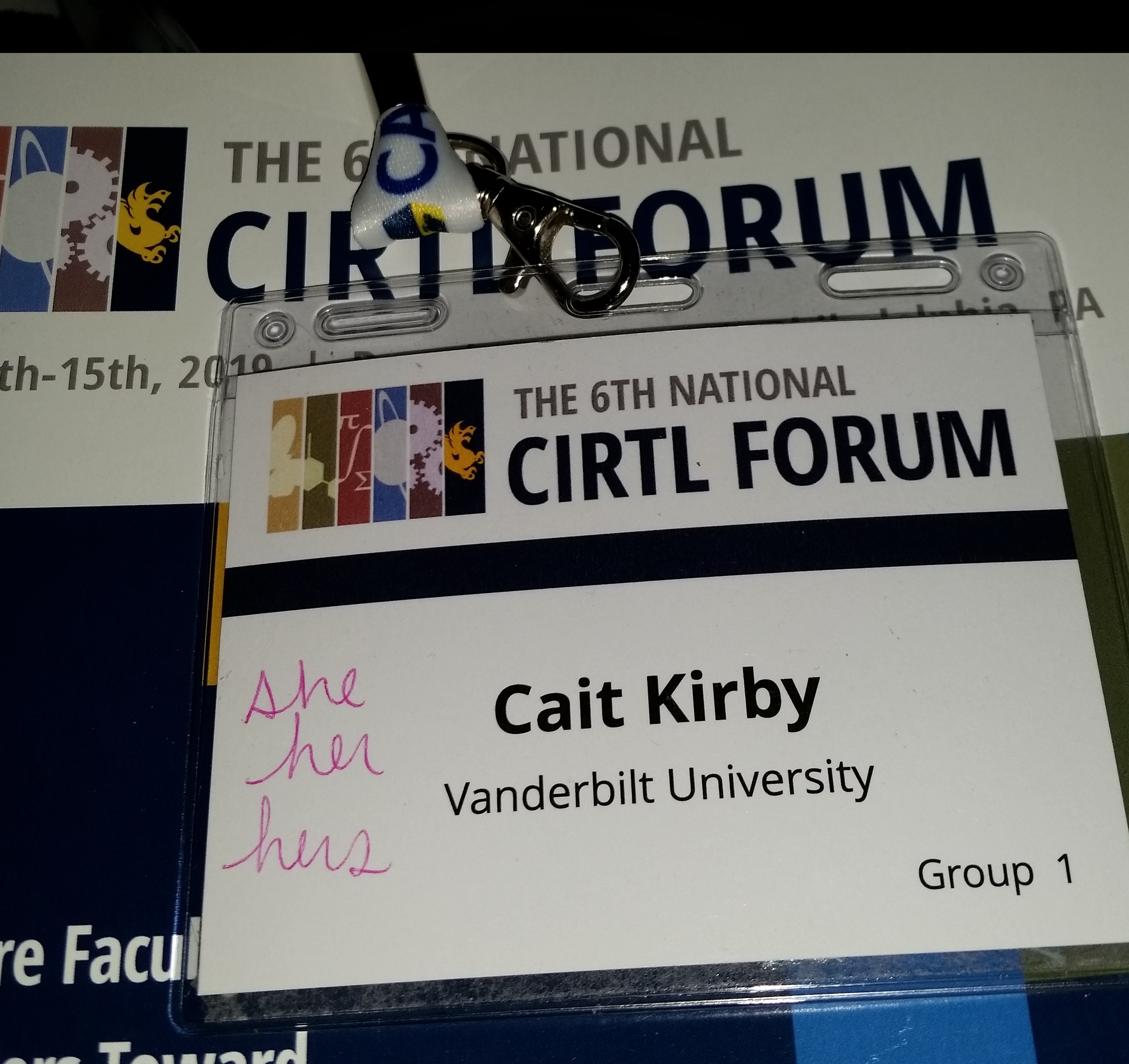2019-12-15 INCLUSION
Author: Cait Kirby
Read time: 7 minutes
Preparing future faculty as change leaders toward inclusive STEM higher education: a perspective
 Cait posing with a dinosaur model at the celebration of Myles Boylan at the science museum.
Cait posing with a dinosaur model at the celebration of Myles Boylan at the science museum.
In October 2019, I attended the CIRTL forum at Drexel University.
The title of this forum was "Preparing future facilty as change leaders ttoward inclusive STEM higher education.""
I was empowered and energized by attending this meeting.
I was empowered by the acknowledgment of the lack of diversity in higher education, and STEM fields.
It is easy to overlook or ignore a problem when the problem has not been named.
By naming and acknowledging the lack of diversity in STEM outright, we can begin a conversation about barriers in STEM.
It may be surprising, but as a student I am not often given the opportunity to discuss the lack of diversity and the consequences that lack has on my experience and experiments.
Having the opportunity to address the negative impact of a predominantly white, cis, straight, able, male academy on students affirmed my experiences, and the experiences of my colleagues.
Further, the speakers addressed the notion that increasing diversity is not enough; diverse students, faculty, and staff must feel and be included and supported.
What they meant is that we cannot simply pay lip service to the concept of diversity, but we must foster inclusive environments where everyone feels like they truly belong.
 Near my name I wrote my pronouns, which you can't read because I wrote them.
For example, "I'm Cait, I use she/her pronouns, I'm a grad student at Vanderbilt, my question is..."
This was such a small amount of effort, but it has the potential for large impact on individuals who identify outside of the gender binary, or individuals who may be often misgendered.
Further, I think this emphasized the point that individuals from underrepresented groups often have to choose whether or not to disclose one or more of their identities.
By creating a culture in which we a) all disclosed our gender, and b) were conscious of the gender identities of other people, we signaled that getting their gender identity right was important to us.
Essentially, we were saying, "we see you, and you are safe here."
Near my name I wrote my pronouns, which you can't read because I wrote them.
For example, "I'm Cait, I use she/her pronouns, I'm a grad student at Vanderbilt, my question is..."
This was such a small amount of effort, but it has the potential for large impact on individuals who identify outside of the gender binary, or individuals who may be often misgendered.
Further, I think this emphasized the point that individuals from underrepresented groups often have to choose whether or not to disclose one or more of their identities.
By creating a culture in which we a) all disclosed our gender, and b) were conscious of the gender identities of other people, we signaled that getting their gender identity right was important to us.
Essentially, we were saying, "we see you, and you are safe here."
I was impressed by the swift move to adopt this change.
I think we should all strive to adapt to constructive criticism this way.
In the future, I suggest that pronouns be included on the name tag or as a ribbon that is obvious.
Using ribbons allows individuals to still opt-in if they do not feel comfortable sharing their pronouns, but it also normalizes sharing pronouns.
Finally, using ribbons ensures that the pronouns are legible (unlike mine).
Further, people can become familiar with the concept of singular they pronouns, for example, when they pick out their ribbon at the registration desk.
I was also left feeling energized by the discussions at the forum.
A common theme at the forum was the idea that changeleaders must focus on accomplishing our immediate goals.
Implicit in these comments is the suggestion that graduate students and untenured faculty keep our focus on graduation and tenure before we try to make change.
While this seems like practical advice, it has two flaws.
First, waiting until we are graduated or tenured means that we are reinforcing the status quo in those positions where we are.
Again, this seems like practical advice, but if we graduate and move on to a new position, who will make change for those grad students at our previous institution?
Second, waiting until we are graduated or tenured is a long time to carry the weight of desiring necessary change and not achieving it.
This was one of the most impactful discussion for me at the forum, because it emphasized the importance and worth of making change during the early parts of our careers. This suggested to me that seasoned faculty should be providing support for students and early-career faculty to be changeleaders and make change.
A few other topics and conversations that were particularly impactful to me came from many speakers and presenters at the forum. Dr. Freeman Hrabowksi provided an active-learning demonstration that involved shouts from the audience, and focused on the connection between words, habits, values, and destiny. Dr. Karen Marrongelle proposed many mechanisms of training future and current teachers to lead more inclusive classrooms, with a focus on learning communities. Dr. David Asai suggested that we reconsider the entire design and structure of introductory biology courses. He suggested we narrow the focus of courses but dive deeper into the content. He also emphasized the importance of promoting scientific thinking and the wonder of discovery. Finally, he cautioned that focusing only on "getting the right answer is the wrong way of doing things." His talk made me want to take his intro bio course.
I also want to note how much I appreciated the inclusion of current graduate students on many of these panels. Since this conference was focused on future change leaders, I am glad that future change leaders were included as experts.
One important aspect of the forum that I want to highlight is the lack of discussion of disability as diversity. We spent a lot of time emphasizing the importance of faculty from diverse backgrounds with respect to gender, sexual orientation, gender identity, and geography/country of origin. However, we did not discuss the important perspectives of disabled students and faculty in our classrooms. Moving forward, I suggest a focus on the unique skills that disabled scholars possess. I would also suggest a consideration of disabled individuals when planning these forums. While Drexel is a beautiful campus, the buildings we used seemed wildly inaccessible. The reception hall that led to the keynote speaker had stairs up to go into the building, and stairs down to get into the lecture room. There were a lot of stairs. The days were incredibly long, and there was little break-time built in. I recognize that it can be exciting to engage fully in the academic material, but some disabled scholars simply cannot manage such long and overwhelming days. I also think that there are other possibilities for new ribbons, in addition to the pronouns ribbons I suggest above. For example, I think if there is a ribbon that indicates that people would like a lot of interaction or little interaction could be useful for individuals with various disabilities. I'm thinking a ribbon that indicates "let's sit while we have this conversation" could be useful for individuals who tire easily or who have difficulty managing standing and keeping up with conversation. A ribbon that indicates "let's find a quiet spot to chat" could help with disabilities involving noise or stimulus overload. I think there are so many ways to make conferences better for people with all kinds of experiences and limitations.
I would like to thank the Vanderbilt Graduate Leadership Institute for funding my trip to the CIRTL forum.
I had a fantastic time and met so many amazing future and current changeleaders!
Thank you for the opportunity to have these discussions and share my perspective.
 Butterfly exhibit at the Academy of Natural Sciences.
Butterfly exhibit at the Academy of Natural Sciences.
Finally, I want to note how enjoyable it was to meet and celebrate Dr. Myles Boylan. I had the honor of speaking with him during the bus ride to the celebration venue, and he regaled me with stories of how he became involved in the funding side of education research at NSF. His enthusiasm and vibrance are palpable and I am grateful for his contributions. Thank you, Myles.